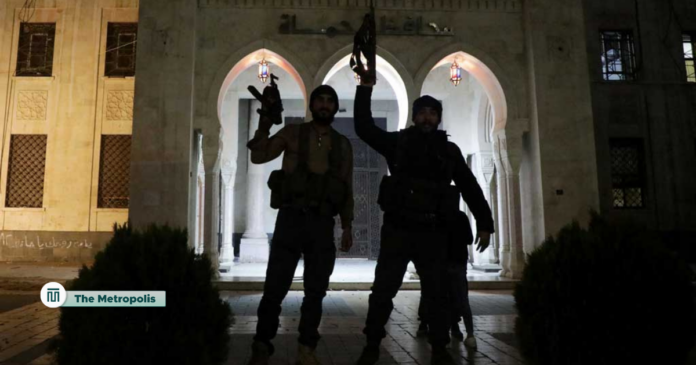Shi’ite Muslim ruling parties and armed groups in Iraq are considering the benefits and drawbacks of using force to intervene in Syria. They see the advance of Sunni Islamist rebels, who have captured two Syrian cities and are currently occupying a third, as a serious threat.
Following the US invasion in 2003, thousands of Sunni fighters from Syria entered Iraq, fueling years of sectarian violence. In 2013, they returned as the Islamic State, seizing a third of the country, adding to Baghdad’s troubled past.
Although Hayat Tahrir al-Sham, the leader of the Syrian rebels currently advancing in Syria, has denied affiliation with Al Qaeda and IS and stated that they have no plans to invade Iraq, the ruling factions in Iraq do not believe those claims.
Iraq’s conventional military and the Popular Mobilization Forces, or PMF, a security organization that includes numerous armed groups with ties to Iran that have fought in Syria, have gathered thousands of fighters on their border.
According to a government adviser, an Iraqi Shi’ite politician, and an Arab diplomat briefed on the situation, the orders so far are to defend Iraq’s western flank rather than to step in to support Syrian President Bashar al-Assad.
According to the sources, however, the calculation may alter, at least for some Iraqi factions, based on events such as the rebels seizing the Syrian city of Homs, the overthrow of Assad, or the persecution of Shi’ites.
While describing the Syrian division as a “red line” for Iraq, Bassem Al-Awadi, a spokesman for the Iraqi government, stated that Iraq does not seek military intervention in Syria.
There hasn’t been a large-scale mobilization from Iraq yet, despite Reuters’ earlier report that hundreds of Iraqi fighters had crossed into Syria to support Assad’s forces, joining Iraqi and Lebanese Hezbollah fighters already present.
Under the leadership of moderate Prime Minister Mohammed Shia al-Sudani, the country’s government has made a valiant effort to stay out of the regional conflict during the Gaza war and instead focus on rebuilding after decades of conflict.
In a televised address on Friday, PMF leader Falih al-Fayadh stated that the Iraqi government has maintained its stance of not taking sides in this crisis from the beginning.
“But it is not wise for there to be a fire in your neighbor’s house while you sleep, reassured without thinking of what might happen,” he continued.
SUDANI aims to prevent regional disputes.
Led by a coalition of primarily Shi’ite political parties and Iranian-affiliated armed groups, Iraq is a key member of Tehran’s so-called Axis of Resistance, which also includes Lebanese Hezbollah and Gaza’s Hamas.
Some analysts view the tens of thousands of seasoned combatants in Iraq’s armed formations as the most suitable force within Iran’s network of allies to intervene in Syria, given that Israeli attacks have severely harmed the latter two players.
Multiple forces frequently pull Iraq’s ruling coalition in different directions. While some parties view such an intervention as destabilizing, others who have previously fought alongside Assad and have interests in Syria are more inclined to re-enter.
In Baghdad on Wednesday, Iraqi Foreign Minister Fuad Hussein met with Iranian Foreign Minister Abbas Araqchi and Syrian Foreign Minister Bassam Sabbagh.
Hussein denounced attacks by “terrorist entities” in Syria at a joint news conference, while Araqchi promised to give Syria all the help it required.
Abu Mohammad al-Golani, the leader of the Syrian rebels, himself started his combat career with Al Qaeda in Iraq, where the United States imprisoned him, before relocating to Syria to establish the extremist organization’s franchise there.
After separating from Al Qaeda in 2016, Golani urged Sudani on Thursday to stop the PMF from getting involved in Syria, claiming in an online video that the rebels wanted to establish economic and strategic ties with Iraq after overthrowing Assad’s government.
According to the government adviser, “They may say they are in a different mood and a different group, but they look very much the same from Iraq.”



